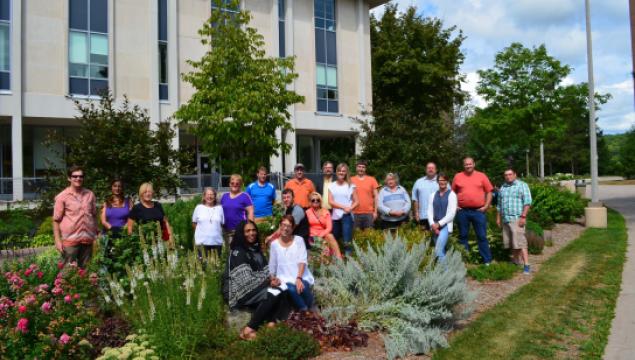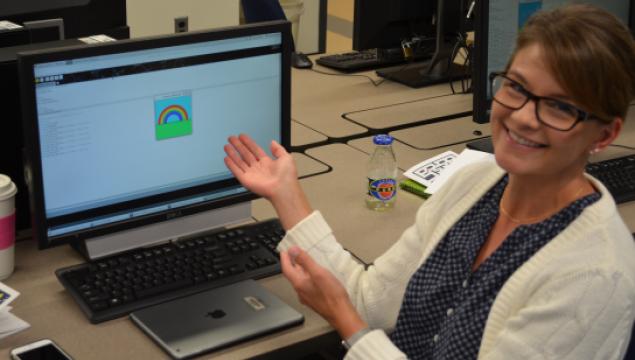CS4All: Bringing Computer Science to K-12 Students
Why This Project Is Important
Coding is the 21st century literacy. Today's youth need experience in building the software that runs so much of today's world (and more of tomorrow's world). Our team is bringing educational opportunities in coding to students in our local community, and it is working with teachers in the Copper Country and beyond as they work coding into their curricula.
Project Description
Today's world runs on code. The power of our computing devices - from smartphones to laptops to supercomputers - affects every aspect of our lives. Learning how to harness this power, through designing, writing and testing software code, is one of today's most challenging, exciting, and rewarding areas of study. Today's young people need exposure to "computational thinking": an understanding of how computer software and hardware technology works, along with practice in creating software solutions of their own.
Computer science gives students practice in problem solving skills that can cross over to mathematics, science and other disciplines. Major technology companies like Google and Microsoft have acknowledged the need for a code-savvy workforce through their support for broad educational initiatives like code.org. While the motivation for K-12 computer science education has never been higher, and the resources available to do it have never been richer, the rate of adoption of computer science curricula across the country is still low. Studies indicate that a lack of peer support for initiatives to bring computer science into the high school curriculum is at least partly to blame. Relatively few K-12 teachers have backgrounds in computer science, and though many are eager to learn new skills, they need assistance.
Given the need for peer support, it should come as no surprise that the number of schools teaching computer science is even lower in disadvantaged or rural areas. Our experiences in the Upper Peninsula of Michigan bear this out. With only 312,000 residents spread across 16,000 square miles, it is easy for communities in this area to remain isolated. Moreover, with low median household income (approximately 50% of the population below the poverty line), it is difficult for school districts to maintain computer science courses or launch ambitious computer science initiatives on their own.
Building a community of learners. Aware of these difficulties, and confident in Michigan Tech’s legacy introducing students to CS, we established the Copper Country Coders (CCCoders) group in 2012. CCCoders is a computer programming club for local middle and high school students. Michigan Tech faculty and students volunteer their time to work with the young programmers, providing curriculum, tools, and classroom tutoring. In 2014-2015 we taught a total of 39 students, of whom eight were young women. We teach programming through a series of exercises exposing students to a variety of languages and topics, including Interactive Fiction, Computer Generated Poetry, Computer Art, Computational Geometry, Artificial Intelligence, and Video Games. Our curriculum has shown promise in attracting and retaining a diverse pool of students. Our advanced students work with the popular, industrial-strength programming language Java, and they participate in college programming competitions. Alumni have gone on to take Computer Science courses at Michigan Tech and organize outreach activities for their peers. Two female students received Aspirations awards from NCWIT (National Center for Women & Information Technology).
Building a community of educators. We are supporting teachers as they work to bring computer science into their curricula. In a summer 2015 workshop, we hosted 16 teachers from the Upper Peninsula and beyond, giving them instruction in basic computing principles, introducing them to the materials we use in Copper Country Coders, and providing tools for increasing interest in computing among young women. This workshop is part of a larger, ongoing community of practice providing support and training for teachers with limited computer background and administrative support. More locally, we have participated in the annual Hour of Code event at Houghton and Hancock schools, visiting computer classrooms and taking students through the basics of coding.
Meet the Researchers

Charles Wallace
Charles Wallace is an Associate Professor of Computer Science at Michigan Tech. His research focuses on how humans can better understand the software they build and use. He is currently working on educational programs for K-12 students, undergraduate Computer Science students, and senior citizens, and he is studying communication and teamwork patterns in software development settings.

Leo C. Ureel II
Leo C. Ureel II is a Lecturer in Computer Science at Michigan Technological University. He worked as a software developer for Fortune 500 companies Coltec and Motorola and as a software researcher at The Institute for the Learning Sciences and Northwestern University. He was co-founder of Redshift Software, a game tools developer and has designed video games for CouchWorld Games.
His research interests focus on understanding how we can use Intelligent Learning Environments to engage students in communication during the learning process. This research has taken him on a journey into Artificial Intelligence, Cognitive Science, and Software Engineering.
Current projects include: development of WebTA, a system that provides automated feedback to students learning how to program. Leo participates in two combined research/outreach programs: Breaking Digital Barriers, which helps adults use computers, and Copper Country Coders, which helps students in grades 6-12 learn to program computers. Leo is also a Program Partner for the National Center for Women & Technology (NCWIT) AspireIT Program.
days left
funded
last
What Your Donation Can Help Us Do:
- Equipment. We are working on new ways to teach programming through robotics and virtual reality. Support for devices like Oculus Rift will offer our students exciting new perspectives on computing.
- Events. Travel funding will allow Copper Country Coders students to participate in regional programming competitions, and to present at Upper Peninsula schools who are part of our educator community. Funds for hosting events like game jams, project expos, and programming competitions will give our students the opportunity to show what they have learned and to practice important organization and presentation skills.
- Instructional materials. The creative, energetic Michigan Tech students who serve as mentors in Copper Country Coders have developed novel programming environments, books, and exercises. Support for these students over the summer will enrich our curriculum and allow us to share more with the wider K-12 education community.
$200 (0/20)
CCCoders T-shirt
$100 (12/40)
CCCoders poster or programming guide
Recent Donors
Some donors may be hidden.





 Gifts to projects listed on SUPERIORIDEAS.ORG are received and processed by Michigan Tech Fund. Michigan Tech Fund is a tax-exempt organization under Section 501(c)(3) of the Internal Revenue Code acting on behalf of Michigan Technological University. It is the policy of Michigan Tech Fund that a portion of the gifts and/or income therefrom may be used to defray the costs of raising and administering the funds.
Gifts to projects listed on SUPERIORIDEAS.ORG are received and processed by Michigan Tech Fund. Michigan Tech Fund is a tax-exempt organization under Section 501(c)(3) of the Internal Revenue Code acting on behalf of Michigan Technological University. It is the policy of Michigan Tech Fund that a portion of the gifts and/or income therefrom may be used to defray the costs of raising and administering the funds.